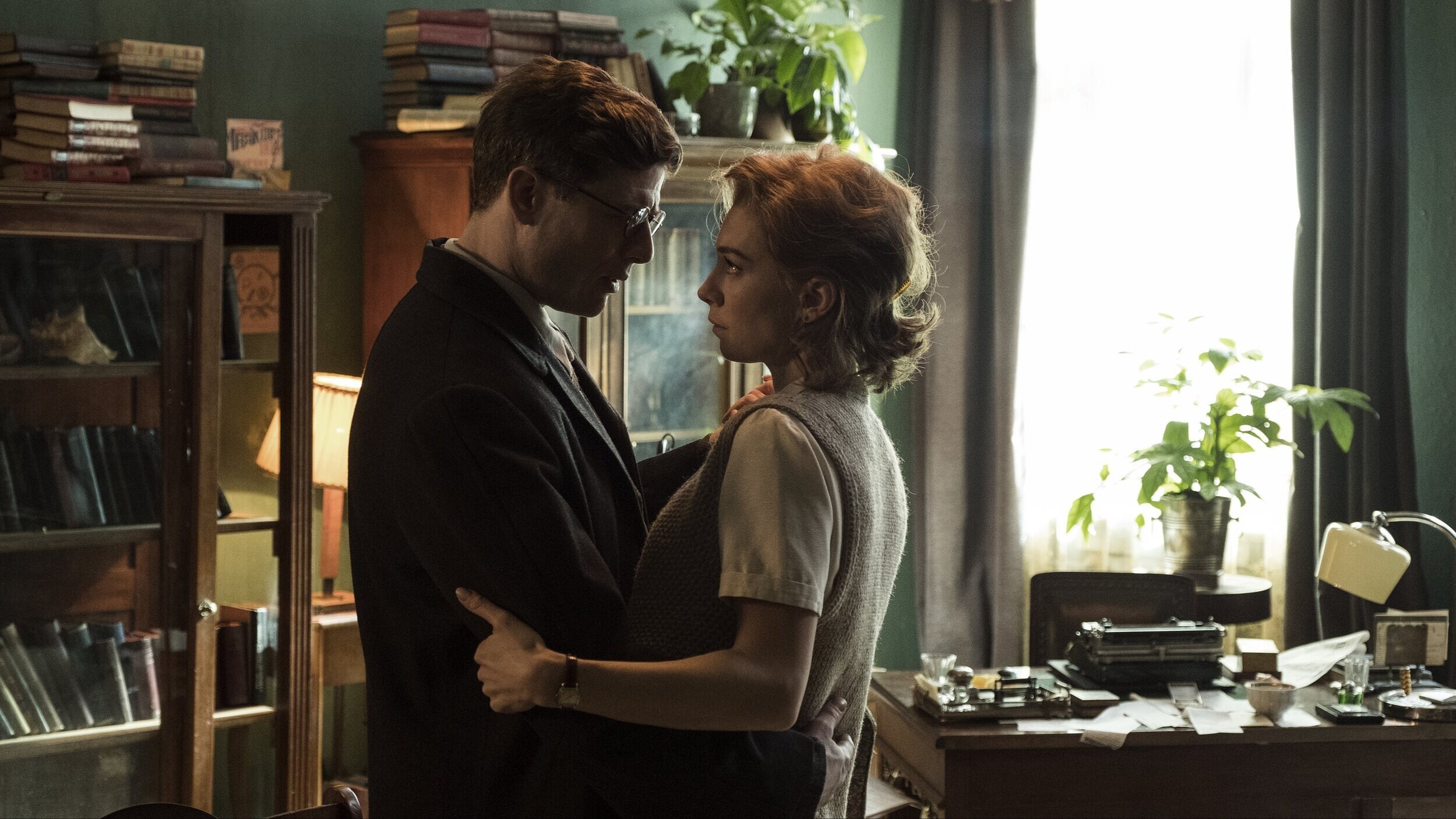Mr. Jones
A political drama of the 1930s which reverberates today.
James Norton and Vanessa Kirby
The Mr. Jones of the title is Gareth Jones a Welsh journalist who made a mark in his lifetime although he would be dead by the age of thirty, quite possibly through being the victim of an assassination. His name is now largely forgotten but in 1933 he famously interviewed Hitler on an aeroplane. Furthermore, following a period as foreign advisor to Lloyd George, he travelled to Moscow on a quest to be granted an interview by Stalin. That did not materialise, but he did hear stories of facts being hidden and decided to take a train to Ukraine to check things out for himself. He was a solitary traveller but one aided by the fact that his mother had for a while lived there teaching English so that in consequence he was able to converse in Russian. What he found on arrival was a country on the very verge of starvation with all its grain being transported to Moscow on Stalin's orders. It would be Jones's report that would expose the genocidal famine of 1932/33. However, what he said was challenged by William Duranty who may have been a Pulitzer Prize winner but who nevertheless as the Russian representative of the New York Times chose to be an apologist for Stalin. His denial of the facts meant that Jones was discredited although history would, of course, reverse that verdict.
There is no doubt that the life of Gareth Jones provides interesting material and it is highly pertinent today to have a reminder of a genocide unknown to many and one which in its tragic horror underlines how easily Ukraine can become the victim of a Russian dictator. That said, one suspects that the story would be better suited to a book than to a film. Agnieszka Holland, the director here, is an experienced hand but Mr. Jones has been cut by 20 minutes or so since it premiered at Berlin, a step recommended by some critics at that time. Yet if Mr. Jones in its present form comes across as a rather clumsy film it is not just because it has been shortened, although some transitions do now seem abrupt. Giving the story effective dramatic shape is far from easy and it really required an experienced writer whereas the screenplay here by Andrea Chalupa marks her debut.
The real climax of the story is the revelation of the famine which comes halfway through: the impact of this is felt but, even so, coming as it does after what is now a relatively fast moving tale of how Jones came to be there, it seems curiously inert rather than forceful. Almost eliminating colour for this key section of the film, Holland makes it appear somewhat stylised: Jones is largely a lone wanderer here and an observer with only limited interaction with the people (when we see children singing about their grievous state it seems set up to compensate). In any case Mr. Jones reverts thereafter to characters such as Duranty and a journalist from Berlin (Vanessa Kirby) with whom Jones had previously had a romance although this is only tentatively touched in and quite possibly fictional. This final section (quite substantial in length) is again not uninteresting in itself, but there is no sense of where it is leading us - the American tycoon William Randolph Hearst (Matthew Marsh) suddenly pops up and from the start there have been scenes featuring George Orwell (Joseph Mawle) and his writing of Animal Farm. Linking that book so very closely to Jones and the Ukraine genocide feels a rather dubious proposition and, quite apart from that, it is likely to confuse viewers unaware that the book was written in the 1940s. When Orwell turns up in the main narrative of the film disputing with Jones it is not necessarily apparent that in view of what we have already seen of him this is akin to being a flashback.
To turn the story of Gareth Jones into really effective cinema I suspect that it needed a more helpful flashback structure, one without Orwell but giving some indication of the full arc that the story would take in order to provide a better sense of shape. Nevertheless, as it stands the film is well acted. James Norton, well known for his TV work, has his most substantial film role yet as Gareth Jones and is most convincing in the part (the recent version of Little Women was his follow up to Mr. Jones). Furthermore, Vanessa Kirby and Kenneth Cranham provide useful support and Peter Sarsgaard comes close to stealing the movie as the weasily William Duranty. Even if a book might have been the better format in which to tell it, this story is unquestionably worthy of being treated today whatever the medium.
MANSEL STIMPSON
Cast: James Norton, Vanessa Kirby, Peter Sarsgaard, Kenneth Cranham, Joseph Mawle, Matthew Marsh, Celyn Jones, Fenella Woolgar, Krzysztof Pieczynski, Martin Bishop, John Edmondson.
Dir Agnieszka Holland, Pro Klaudia Smieja, Andrea Chalupa and Stanislaw Dziedzic, Screenplay Andrea Chalupa, Ph Tomasz Naumiuk, Pro Des Grzegorz Piatowski, Ed Michal Czarneski, Music Antoni Lazarkiewicz, Costumes Ola Staszko and Galina Otenko.
Film Produkcja/Crab Apple Films/Kinorob/Studio Orka-Signature Entertainment.
119 mins. Poland/Ukraine/UK. 2019. Rel: 7 February 2020. Cert. 15.


